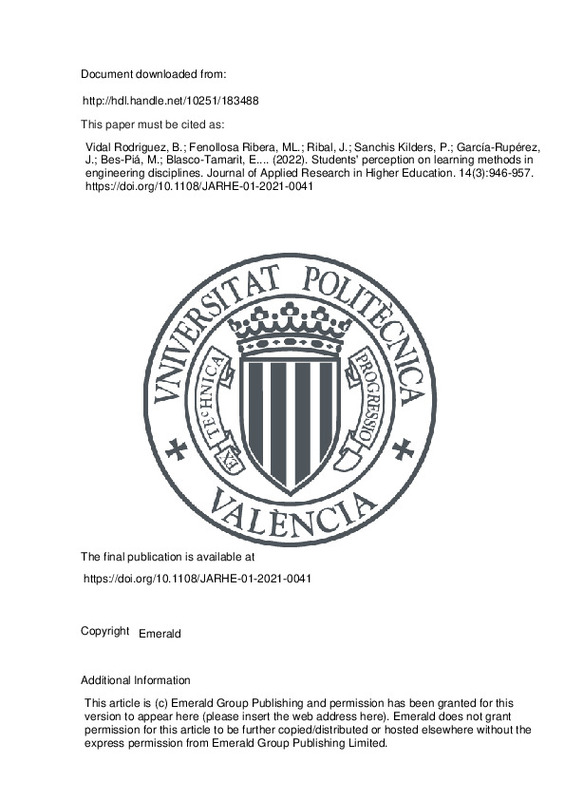JavaScript is disabled for your browser. Some features of this site may not work without it.
Buscar en RiuNet
Listar
Mi cuenta
Estadísticas
Ayuda RiuNet
Admin. UPV
Students' perception on learning methods in engineering disciplines
Mostrar el registro sencillo del ítem
Ficheros en el ítem
| dc.contributor.author | Vidal Rodriguez, Borja
|
es_ES |
| dc.contributor.author | Fenollosa Ribera, M. Loreto
|
es_ES |
| dc.contributor.author | Ribal, Javier
|
es_ES |
| dc.contributor.author | Sanchis Kilders, Pablo
|
es_ES |
| dc.contributor.author | García-Rupérez, Jaime
|
es_ES |
| dc.contributor.author | Bes-Piá, M.A.
|
es_ES |
| dc.contributor.author | Blasco-Tamarit, E.
|
es_ES |
| dc.contributor.author | Noguera Murray, Patricia Silvestre
|
es_ES |
| dc.contributor.author | Muñoz-Portero, María-José
|
es_ES |
| dc.contributor.author | Tortajada-Genaro, Luis Antonio
|
es_ES |
| dc.date.accessioned | 2022-06-20T18:05:13Z | |
| dc.date.available | 2022-06-20T18:05:13Z | |
| dc.date.issued | 2022-05-31 | es_ES |
| dc.identifier.issn | 2050-7003 | es_ES |
| dc.identifier.uri | http://hdl.handle.net/10251/183488 | |
| dc.description | This article is (c) Emerald Group Publishing and permission has been granted for this version to appear here (please insert the web address here). Emerald does not grant permission for this article to be further copied/distributed or hosted elsewhere without the express permission from Emerald Group Publishing Limited. | es_ES |
| dc.description.abstract | [EN] Purpose - This study explores the preferences for learning methods among the students of seven engineering disciplines in a Spanish technical university. The purpose of this paper is to investigate the students' views and from them contribute to the knowledge of the effectiveness of learning methodologies. Design/methodology/approach - An online anonymous questionnaire survey was adopted to collect students' perceptions. Seven learning methods were compared in seven engineering degrees. The authors sampled 1660 students, and 426 completed responses were analysed. In addition to a descriptive analysis of the results, a multiple correspondence analysis (MCA) was performed using R data processing software. Findings - It was found that project-based learning and problem-based learning were perceived as the more effective ones. MCA identified response patterns between the preference and the efficiency of learning methods showing that students can be classified into two groups according to their preferred level of activeness in learning. Research limitations/implications - The study focusses on a single technical university and not all engineering degrees could be sampled. However, five different engineering fields were studied and no significant differences among them were found. Practical implications - The results add up to the known literature showing that students have different learning needs and consequently they perceive some methods as more effective. Instructors can use this information to strengthen their learning activities. Results also suggest that students can be classified into two groups in relation to their level of activeness in learning. This can also help to enhance general student motivation if two paths with different levels of activeness are planned. Originality/value - No previous studies have compared several learning methods in different engineering fields. Thus, this study contributes to fill this gap and contributes to the body of evidence around learning methodologies from the perspective of students. | es_ES |
| dc.language | Inglés | es_ES |
| dc.publisher | Emerald | es_ES |
| dc.relation.ispartof | Journal of Applied Research in Higher Education | es_ES |
| dc.rights | Reserva de todos los derechos | es_ES |
| dc.subject | Perception | es_ES |
| dc.subject | Assessment | es_ES |
| dc.subject | Active learning | es_ES |
| dc.subject | Teaching methods | es_ES |
| dc.subject.classification | TEORIA DE LA SEÑAL Y COMUNICACIONES | es_ES |
| dc.subject.classification | INGENIERIA QUIMICA | es_ES |
| dc.subject.classification | QUIMICA ANALITICA | es_ES |
| dc.subject.classification | ECONOMIA, SOCIOLOGIA Y POLITICA AGRARIA | es_ES |
| dc.title | Students' perception on learning methods in engineering disciplines | es_ES |
| dc.type | Artículo | es_ES |
| dc.identifier.doi | 10.1108/JARHE-01-2021-0041 | es_ES |
| dc.rights.accessRights | Abierto | es_ES |
| dc.contributor.affiliation | Universitat Politècnica de València. Departamento de Comunicaciones - Departament de Comunicacions | es_ES |
| dc.contributor.affiliation | Universitat Politècnica de València. Departamento de Economía y Ciencias Sociales - Departament d'Economia i Ciències Socials | es_ES |
| dc.contributor.affiliation | Universitat Politècnica de València. Departamento de Química - Departament de Química | es_ES |
| dc.contributor.affiliation | Universitat Politècnica de València. Departamento de Ingeniería Química y Nuclear - Departament d'Enginyeria Química i Nuclear | es_ES |
| dc.description.bibliographicCitation | Vidal Rodriguez, B.; Fenollosa Ribera, ML.; Ribal, J.; Sanchis Kilders, P.; García-Rupérez, J.; Bes-Piá, M.; Blasco-Tamarit, E.... (2022). Students' perception on learning methods in engineering disciplines. Journal of Applied Research in Higher Education. 14(3):946-957. https://doi.org/10.1108/JARHE-01-2021-0041 | es_ES |
| dc.description.accrualMethod | S | es_ES |
| dc.relation.publisherversion | https://doi.org/10.1108/JARHE-01-2021-0041 | es_ES |
| dc.description.upvformatpinicio | 946 | es_ES |
| dc.description.upvformatpfin | 957 | es_ES |
| dc.type.version | info:eu-repo/semantics/publishedVersion | es_ES |
| dc.description.volume | 14 | es_ES |
| dc.description.issue | 3 | es_ES |
| dc.relation.pasarela | S\438830 | es_ES |







![[Cerrado]](/themes/UPV/images/candado.png)

